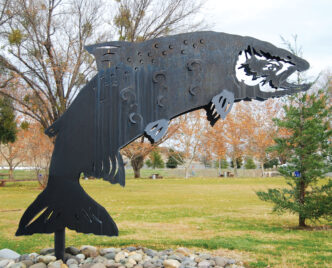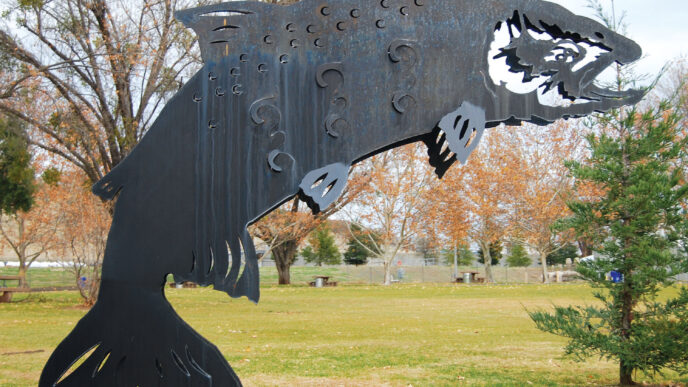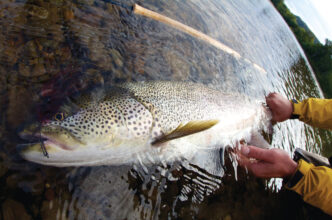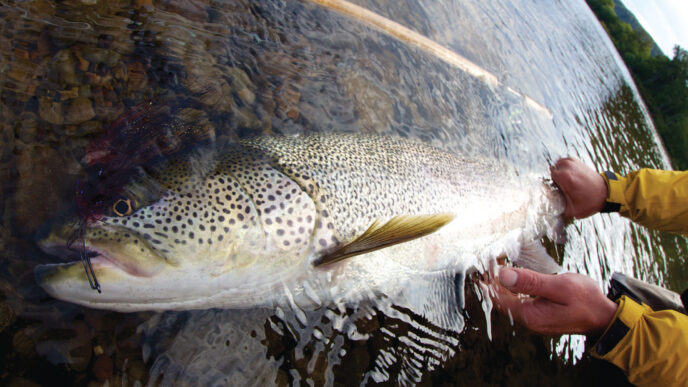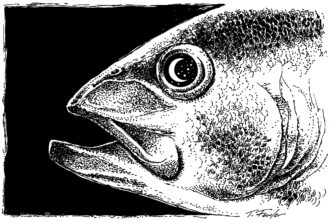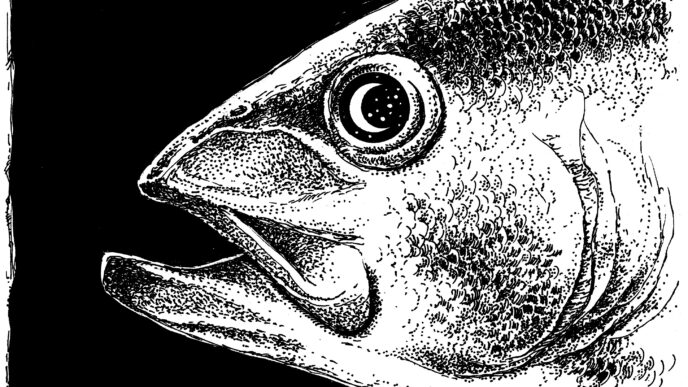The following meander includes quotes from an Internet bulletin board. My hope was to attribute these entries, but my account does not allow e-mail contact. A query about protocol addressed to the group moderator has not been answered, so to preserve to the privacy of members who do not expect to see their comments in a larger forum, I present excerpts anonymously, with apologies and regrets.
Like faith, love, honesty, and kittens, fly fishing has monetary value in the world of business. It’s a way to sell something — even a way to sell yourself. In popular culture, fly fishing’s presumed ethos and aesthetic is employed by campaigns to influence markets. And for the last several decades, at least, fly fishing has been used by some as a tool for building interpersonal bonds that improve a bottom line. It’s seen not so much as a sport, but as an investment.
Devotees may resent this. What is to them a passion and pleasure — a tapestry woven from a love of wildness and life’s warmest memories, shot through with brilliant colors and excitement — is to others a way to do deals. Protesting this point of view is, well, pointless, and for anybody involved in the fly-fishing publishing industry, protesting the monetization of the sport in any form is probably hypocritical.
Even so, it’s sometimes hard not to wonder about limits. My own have been tested twice recently. The first time was a grossly cynical transgression — the appearance of a fly fisher in a slick Canadian television advertisement promoting construction of a gas pipeline that angling and environmental groups believe will prove catastrophic for fisheries. It’s likely only a director’s incompetence that provides shots of a cast crashing into a lake like a wire-guided missile, but the ad also might be a shot across the bows of fly fishers leading efforts determined to oppose the project.
The second trial was less desperate, but more complex. It arrived in an e-mail invitation to a discussion on the only Internet fly-fishing bulletin board I visit — exactly the kind of inquiry that keeps me away from others, not from lack of interest, but for fear I’ll burn time reading threads and composing elaborate responses.
Alas, the flesh is weak. Not so the irony, however.
Like other members, I joined this group by mistake, thinking it was for folks in the fly-fishing business. Instead, it’s for business people who fly fish. The result is a mix of both: people who identify themselves as fly-fishing guides, instructors, and (bona fide) experts; financial analysts and telecom consultants; also fly designers and tyers, marketing directors and account reps, tackle-shop and lodge owners, Web content managers, insurance execs, and sales VPs.
It’s a civil group overall, albeit prone to problems created by members who so often violate rules against commercialization that promotions threaten to subsume discussions about fly fishing. These lead to frequent cautions from the site monitors, pleas to maintain purity of purpose, and they sometimes make me wish for intervention by the spanking hand of somebody like Dan Blanton, who doesn’t tolerate that sort of thing on his BB. Maybe the problems are due to the business emphasis, but what’s certain is that the orientation spawned a question that might not appear on other boards and influenced many of 35 responses spread out over a month.
I entered this conversation about two weeks in, lured by somebody wondering, “Is fly fishing the new golf?” From there, I worked back to the original post: “I often hear that if you are going to be in business that you need to golf. However, I have also heard that fly fishing is second if not equal as a way to get your clients out of the office and build an informal relationship which can be profitable in the future. Your thoughts?”
Neither asker appeared to imagine this might offend anybody. It did, but only a few. Far more members were willing to consider this a straightforward marketing issue. Eventually, as often happens in threads this long, people also essayed opinions about topics tangentially related: fly fishing compared with golf, philosophically or experientially, in general terms or as defined more personally; also, posts indirectly suggesting that an appreciation of fly fishing influences business in ways that benefit both.
Let’s begin with the generic replies, starting with a medley of those pleasingly indignant, if not precisely on topic, and from there proceed to others taking more careful aim.
Golf is . . . “a good walk ruined” (a quote that the poster wrongly attributed to Winston Churchill), requiring players to wear “hideous clothes in colors I would only use for tying bass bugs,” an activity “God invented for people who cannot fly fish,” “And we are thankful for all the golfers who are putting about and not on our favorite trout stream!” An “Amen!” to one of the above inserted a link to an article at unaccomplishedangler.com, “Fly fishing and Golf: Kindred Spirits?” — a tongue-in-cheek piece by Kirk Werner that lists the two sports’ similarities and differences. Both golf and fly fishing began in Scotland, involve steep learning curves, require expensive gear, also stiff wrists for proper strokes, and, of course, “Golf has Tiger Woods. Fly fishing has a Tiger Trout.” But “Golf is a four-letter word. Fly-fishing has ten letters, and sometimes even a hyphen”; also, “Golfers are notorious liars” who will “cheat on their score if given the opportunity to do so without getting caught,” while “Anglers are an honest lot and are never known to exaggerate the size of a fish or the total number of fish caught.”
A little levity never hurts, but Werner does offer a sober note: “I’ve heard fly anglers proudly proclaim that they gave up golf. I’ve never heard a golfer say that they gave up fly fishing.”
Other writers started seriously and stayed that way.
“This is a profound examination of two pursuits, one a sport the other a passion. I fly fish for myself and my sanity, always have. I don’t want to fly fish with anyone, that’s why I live where I do. I teach others, but want them to find their own niche spot and leave me alone. Fly fishing, in my case, is a lifelong recreational pursuit, business is business, ‘never the twain shall meet.’”
“When I recreate or undertake leisure, I usually do not like to talk business. I guess that is the norm on the golf course, and that is fine, but it makes me happy that my hobbies are not tainted with professionalism.”
“I had a colleague last year ask me if I would teach him to fly fish so he could create some new relationships with customers. I told him I would totally take him out . . . but only if he wanted to create some new relationships with fish.”
And there was an entry that elegantly expressed regret in a post I wish I could excerpt in its entirety. Now retired, the writer believes that “using golf for business was a total disaster for me,” because he learned too much about those with whom he played, “especially in private clubs (where, not incidentally, the money is).” In fly fishing, by contrast, he found people who “love the sport, the venue, the outdoors, and the connection with the wild.” He urged: “Compare stories around the table at the 19th hole, against those around the campfire.”
There’s an inference about character in this post that nobody else explored. But the allusion to relationships — good, bad, or “profitable in the future” — resonated with people willing to address fly fishing specifically as a business issue. There was in these a clear trend. One objected for practical reasons: a foursome allowed him to spend more time with guests than a one-day bank or drift-boat fishing trip, so “I’d say golfing wins if you’re trying to do business.” The rest, however — roughly a dozen — asserted that both golf and fly fishing provide ample opportunities to bond, so do both, if you can. Better yet, combine them: “I take clients on annual Triathlon Events. This is where we golf in the morning, fly fish in the afternoon, and then enjoy cocktails in the evening. This is something they truly remember and talk about for years.”
And a few members of the BB have seen that succeed on a grand scale. One describes at length the power, money, and influence that collects at a famous fly-fishing event — senators, prime ministers, the CEOs of the world’s largest corporations — where he’d witnessed deals and political brokering that not only created individual fortunes, but ultimately preserved a blueribbon stream, then led to multimillion dollar donations for preservation of other trout habitat.
Oddly enough, this came from a member most adamant about not mixing passion with business. I’m not entirely sure how that worked for him, but am grateful for results that fly fishers can welcome.
And does that answer the question? Does all that taken together convince you that fly fishing is actually an investment that pays off in money, power, and influence?
I’m not sure.
Reflecting on this discussion, I returned to a Ken Cowgill short story I read last year in Sunlit Riffles and Shadowed Runs. In “Two Men in a Museum,” an older, affluent narrator remembers the kinds of trips this discussion talks about, each “taken mostly out of necessity with well-heeled hosts and clients . . . at various places in America and abroad. Somehow the sport had never taken. He’d felt little more, landing even the largest fish, than a swell of ego at the impression he knew he’d made on the more experienced anglers at his side.” While this is fiction, the character resembles a few fly fishers I’ve met, players who seemed unlikely to leave aside competition and calculation, no matter where they were.
In fact, however, I’ve met far more business people who did enjoy themselves, individually, and once as a group of half a hundred nonfishing lawyers and bankers hosted at lodge on the Trinity River. Those I spent time with seemed to have a ball. I’m confident most left with good memories, maybe great, and still wonder how many might have found something valuable enough to lure them on. If that seems Pollyanna-ish, consider how many folks first picked up a rod to fit in with family or friends, or maybe to share more time with spouses, and today are both fanatics and advocates.
Not a lot to go on, but consistent with enough of the comments I read to suggest something similar might be a good idea. Does that mean I support it?
There’s a bit of an “eh” factor here. I’d hate to see in-flight magazines hawking programs to help people “Close sales with a cast!” Beyond that. . . .
I’m with all the fly fishers who like both of these sports. After golfing for years and working at a country club, I’m not convinced the two cultures have all that much in common. There really is a difference between conversations around campfires and those in a clubhouse.
I made that point on the bulletin board in my own reply. And maybe because I don’t care much for the use of something I love for personal advantage and gain, I aimed mine not at the hosts who seek to use fly fishing that way, but at those they invite; also at people wondering which sport to learn for whatever reason. I tried to stay more or less morally neutral, offering helpful suggestions instead of a sermon. Here’s an edited, abridged, and abbreviated version:
I’ve fly fished pretty widely with a variety of people, including a few big-time players met in posh places. I also golfed for almost a decade, and for a time mixed drinks in the “Men’s Grill” of a country club where both the bar and the course were serious business venues. For what it’s worth. . .
Golf’s far more popular, with a history and tradition as a market game, but the basics are hard to learn well enough to avoid outright embarrassment; duffers frustrate other players no end and can easily leave them grim. If you go this route, learn — a lot — before you accept any invitation. Take lessons, practice, take more lessons, and practice, practice, practice. Unless you’re a marvel of coordination, plan on devoting a hundred hours or two before trying to keep up with a foursome of even intermediate players. Did I mention the rules and etiquette, which — as with “gimme” putts — aren’t always the same?
Learn those, too. Then take care. The competition rampant on golf courses can create interpersonal dynamics as complex as corporate negotiations or in-law spats. The role of novice is tricky enough, but if you ever get too good, or handicap-lucky, you’ll learn that Type A folks don’t take losing lightly. (I cannot tell you how many furious multimillionaires I saw sulk about bad shots or rounds or partners who cost them a bet. Good luck, if that partner is you.)
Learn to drink. Your limits while playing are not the same as at a cocktail party. Then learn how others drink. One member of my old club ordered a 10-ounce water glass full of gin — “with just one damn ice cube” — for the front nine, along with a six-pack, then a second glass and six for the back. (I never heard him slur a word, but trying to match that pace could kill you.) Then beware of how others manipulate their drinks: shrewd operators would approach me before a postround lunch negotiation (or gambling session) with whispered instructions: “I’m going to buy for me and this guy. When I order Jack-and-Coke, you pour me straight Coke, understand?” (I did, so whenever possible served set-up “suckers” with screwdrivers only lightly mixed with ethanol in any form. Note that Johnny Walker Black served straight up cannot be tweaked.)
While learning to fly fish presents physical challenges similar to golf’s, talking here about swing and cast, in my experience, you’ll face fewer perils on streams than at the nineteenth hole. Do take casting lessons before your first trip, please please please, and learn how to tie a fly to a line. If you’re expected to bring your own tackle, make sure you have basics such as nippers, leader and tippet, floatant, and a fair selection of appropriate flies.
You still won’t have all you need or know what you must have. Not to worry — much. While some fishers compete against others, the vast majority pit themselves only against fish, and the sport has a deep (and merciful) commitment to mentoring. Don’t exploit this, even by accident. Give your partners a lot of space and time to themselves.
If the sum of the above suggests that fly fishing’s a better “investment,” let me correct that impression. Golf and its country clubs are made for money — everybody knows that. It’s why memberships were tax write-offs and maybe still are. While fly fishing might be a better way to make lasting relationships, trying to manipulate these is dicey, and to me — a confessed devotee — smells like marrying for money.
Gold diggers do fall in love, of course, and maybe you will. I hope so and wish you the best of luck.






